
Kult is a Polish rock band formed in 1982 in Warsaw, originally consisting of Kazik Staszewski, Piotr Wieteska (bass), Tadeusz Bagan (guitars) and Dariusz Gierszewski (drums). Kult's early works were strongly influenced by alternative, progressive and punk rock, as well as the British new wave, but the band gradually incorporated more diverse and innovative styles in their music. The music of the band is primarily associated with strong lyrics by Staszewski and distinct wind section.
2 Plus 1 were a Polish band performing pop and folk music, and, in the later period of their activity, also synthpop and rock. They were founded in 1971 by Janusz Kruk and Elżbieta Dmoch. The band recorded ten studio albums, three of which have been certified Gold in Poland, and established such evergreen hits as "Chodź, pomaluj mój świat", "Windą do nieba" and "Iść w stronę słońca". They have won a number of local and international awards, and performed in countries around the world, such as Germany, the Soviet Union, the United States, Canada and Cuba. 2 Plus 1 enjoyed their biggest popularity in the 1970s, but remained successful into the mid-1980s. In addition, the band achieved notable success in Western Europe and Japan with the songs "Easy Come, Easy Go" and "Singapore". The end of 2 Plus 1's activity was marked by the death of Janusz Kruk in 1992. A successful, but short lived reunion took place at the end of the 1990s. 2 Plus 1 remain one of the most successful bands in the history of Polish popular music, and their musical legacy still proves influential in Poland.

Big Cyc is a Polish rock band formed in March 1988.
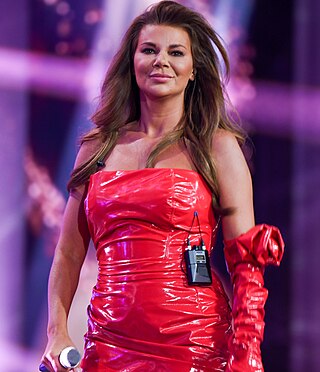
Edyta Anna Górniak is a Polish pop singer. Górniak started as a musical theatre actress in 1990. She performed in the most popular musical in Polish history, the Tony Award-nominated Metro. Some of its shows took place on Broadway. Górniak was Poland's first representative in the Eurovision Song Contest in 1994 with the song "To nie ja". She placed second which still remains the country's best result at the competition. This started her decades-long career as a pop singer in her native country and internationally. She is also known for her 1997 single "One and One". She is the recipient of the Bronze Medal for Merit to Culture – Gloria Artis for her contributions to the arts.

Dezerter, founded as SS-20 in May 1981 in Warsaw, is one of the most popular punk bands from Poland. The band was founded by three students of Warsaw's vocational high school (technikum) - Robert "Robal" Matera (guitar), Krzysztof Grabowski (drums), and Dariusz "Stepa" Stepnowski (bass). All three were born in 1963, and went to the same class. From the beginning Grabowski wrote lyrics, and Matera music. The three classmates originally planned to name their band Sektor A, but after some time changed their minds and named it SS-20. Soon afterwards, they were joined by another student of the same school, Dariusz "Skandal" Hajn, who, as Grabowski later stated, "looked like a real punkrocker". The band started regular rehearsals in the summer of 1981. With fast guitar riffs and intelligent lyrics written by Grabowski, Dezerter's concerts drew thousands of fans and its LPs were very popular, especially in the late 1980s and early 1990s.

Andrzej Trzaskowski was a Polish jazz composer and musicologist. From the mid-1950s onward, he was regarded as an authority on syncopated music.

Katarzyna Magdalena Rooijens, professionally known as Kayah, is a Polish singer-songwriter performing a variety of music genres, including pop, soul, jazz, world and dance. She has also experimented with disco, funk, electronica as well as Balkan and Jewish music.

Perfect is a Polish rock band founded in 1977 by drummer Wojciech Morawski, bass guitar player Zdzisław Zawadzki and lead guitar player Zbigniew Hołdys. They are one of the all-time most popular rock bands from/in Poland.
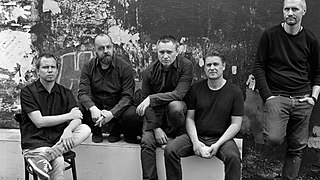
Variété is a new-wave and cold-wave band from Poland, considered the leading pioneers of that genre in 1980s. The group is continually evolving and their music can be now described as an original blend of jazz, minimal and trip-hop.

Happysad is a Polish rock band. The band plays melodic rock with elements of punk and reggae. It was created in Skarżysko-Kamienna in 2001 by musicians who had been playing since 1995 under the name HCKF. In 1997 the name was changed to Happy Sad Generation. The name Happysad was established in 2002.
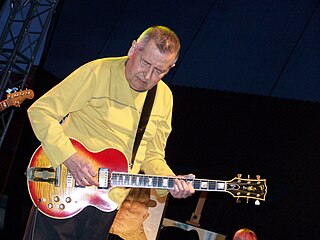
Tadeusz Nalepa was a Polish composer, guitar player, vocalist, and lyricist.

Czerwone Gitary is one of the most popular rock bands in the history of Polish popular music. The band formed in 1965 and achieved its greatest success from 1965 to 1970. Often considered the Polish equivalent of the Beatles, many of their hits are now classics in Poland. The group toured extensively outside Poland but had mostly disappeared from the Polish scene by the 1980s. The band reformed in the 1990s.

Janusz Szrom is a Polish jazz vocalist and composer.
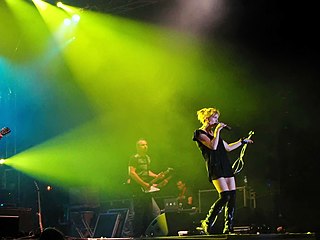
Łzy are a Polish pop rock band formed in 1996, best known for their early 2000s hits "Agnieszka już dawno...", "Narcyz się nazywam", "Jestem jaka jestem" and "Oczy szeroko zamknięte", among others. The group has released one gold and three platinum certified albums in Poland. Up until 2010, the band's lead vocalist was Anna Wyszkoni who continued a successful solo career. Łzy are known for their sad, melancholic lyrics, exploring loneliness, unhappy love and heartbreak, occasionally touching on controversial subjects, such as suicide, rape, abortion, euthanasia and drugs.

Chmury nie było is the second studio album by the Polish experimental metal band Kobong. Most of the album was recorded between January and February 1997 in studio D-7 in Wisła, while the acoustic versions of "Przeciwko" and "Prbda" were recorded live in the studio in November 1996.

Comfort and Happiness is the debut studio album by Polish singer Dawid Podsiadło. It was released on 28 May 2013 through Sony Music. It was produced by Bogdan Kondracki.

Krzysztof "Polo" Poliński is a Polish rock drummer, session musician, and arranger. Throughout his career, he has participated in numerous music projects encompassing genres such as jazz, blues, and hard rock, with particular focus on rock.
Deus Meus is a Polish band that plays Christian music, mainly soul, funk, and reggae.
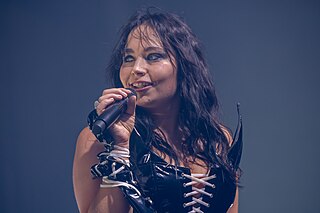
Maria Ewa Żak, known as Mery Spolsky, is a Polish singer, songwriter, composer, music producer and clothing designer.

Witold Stefan Paszt was a Polish singer, founder and vocalist of the Vox band.


















